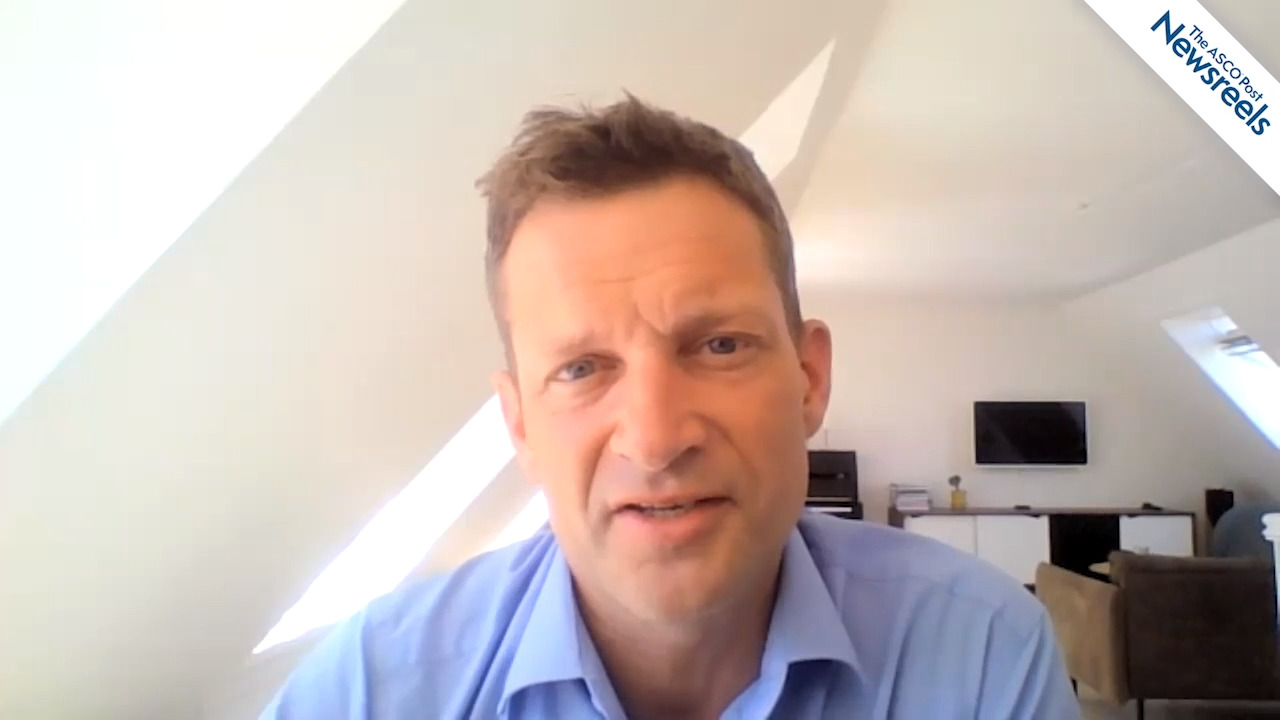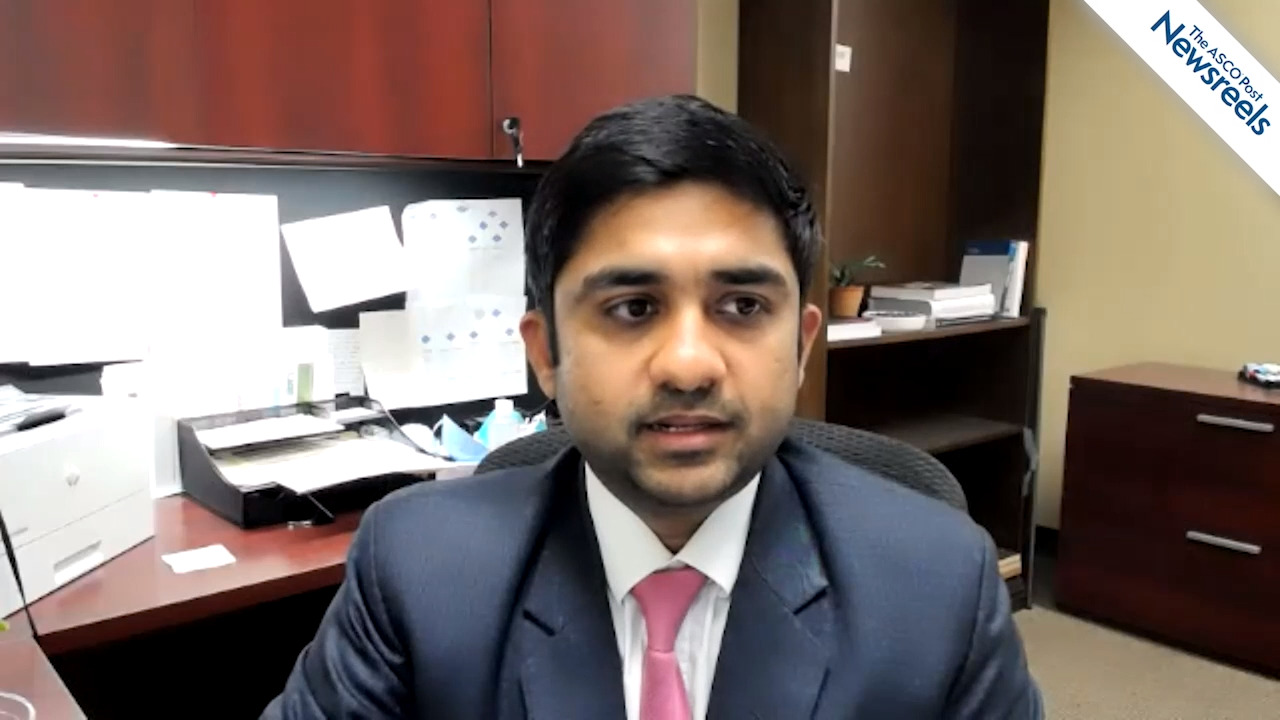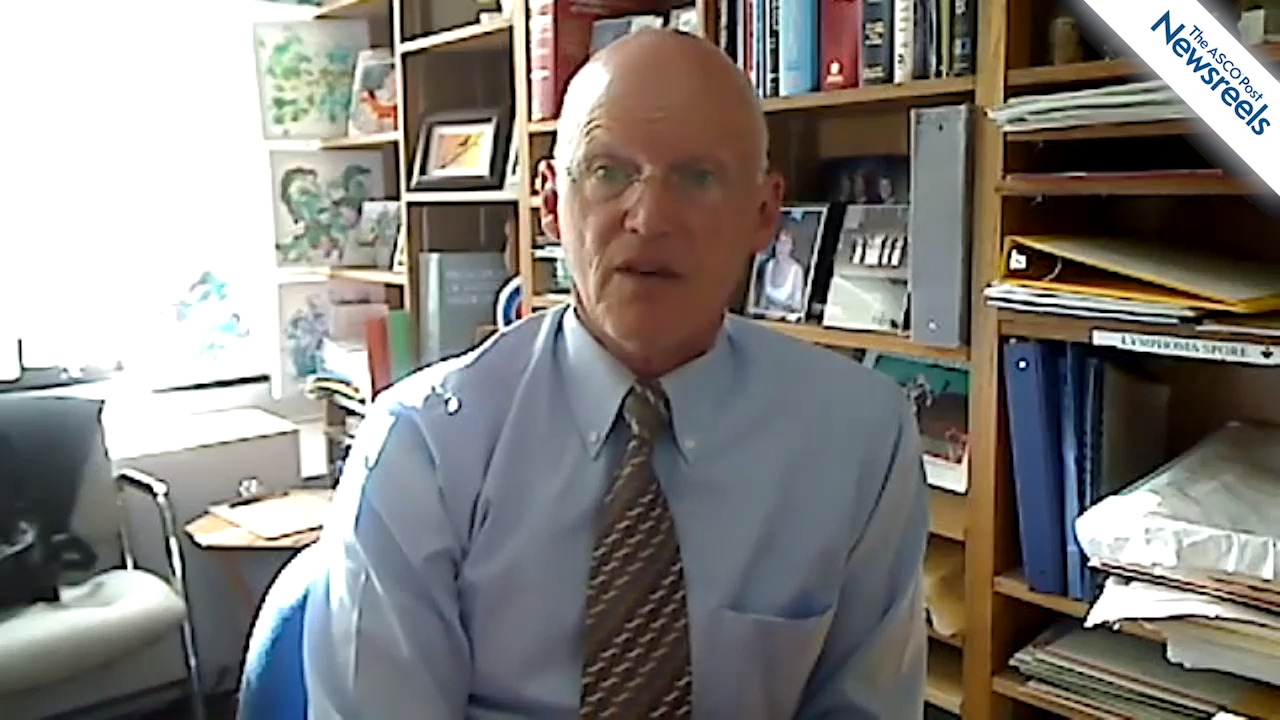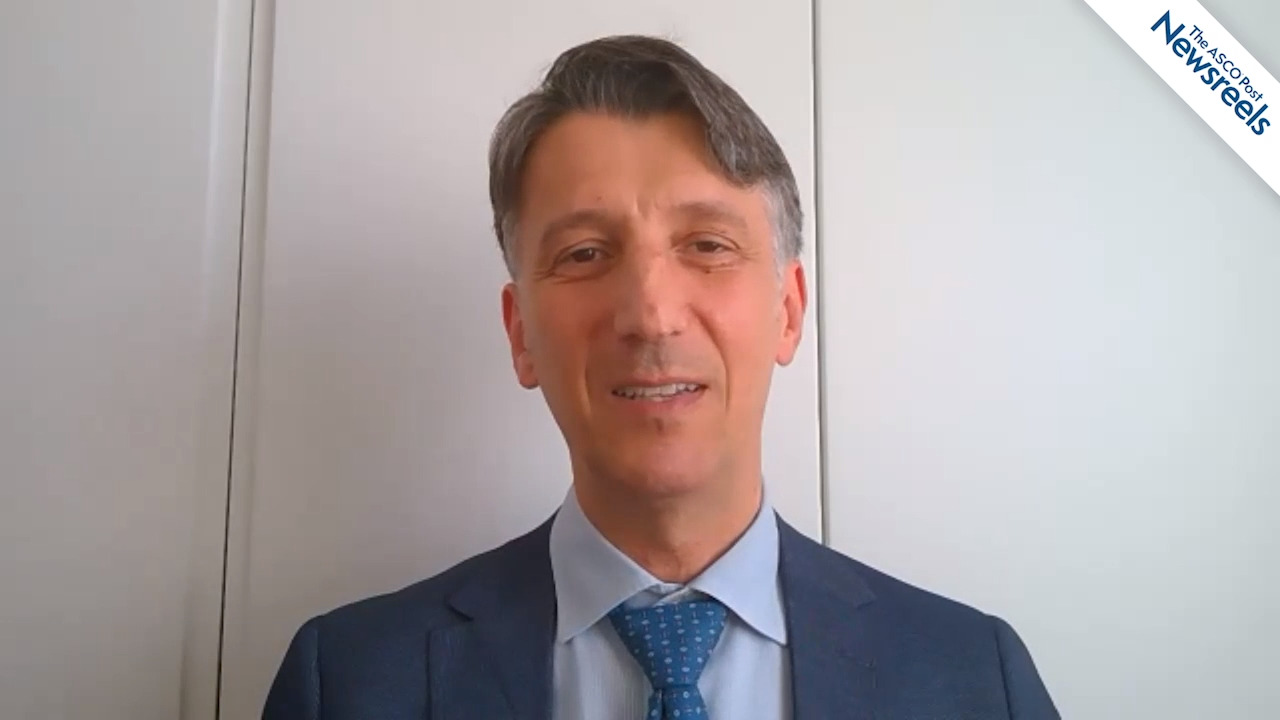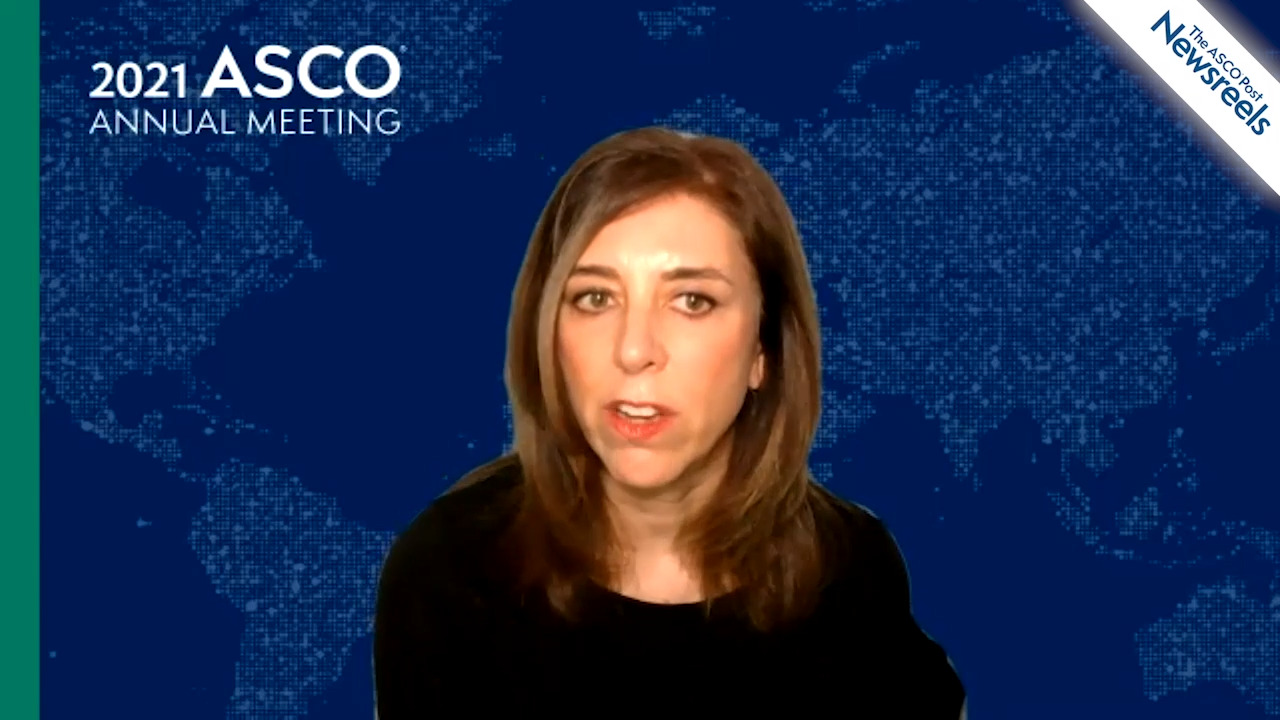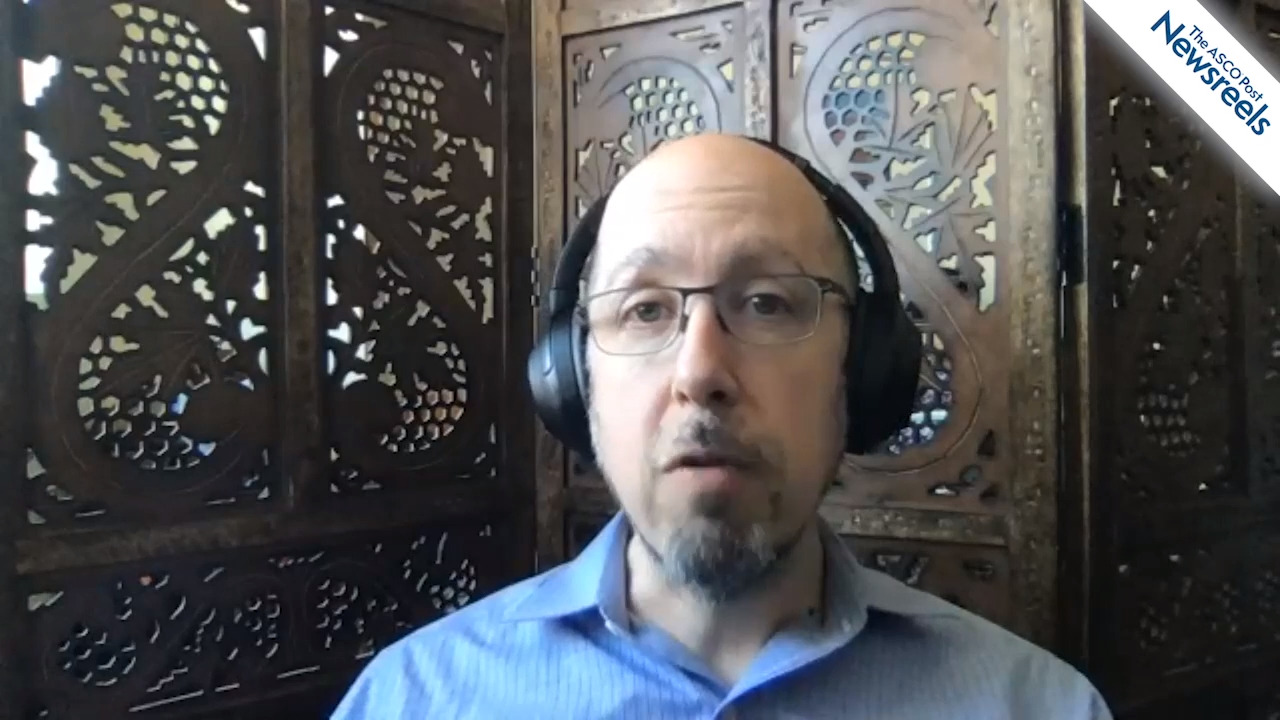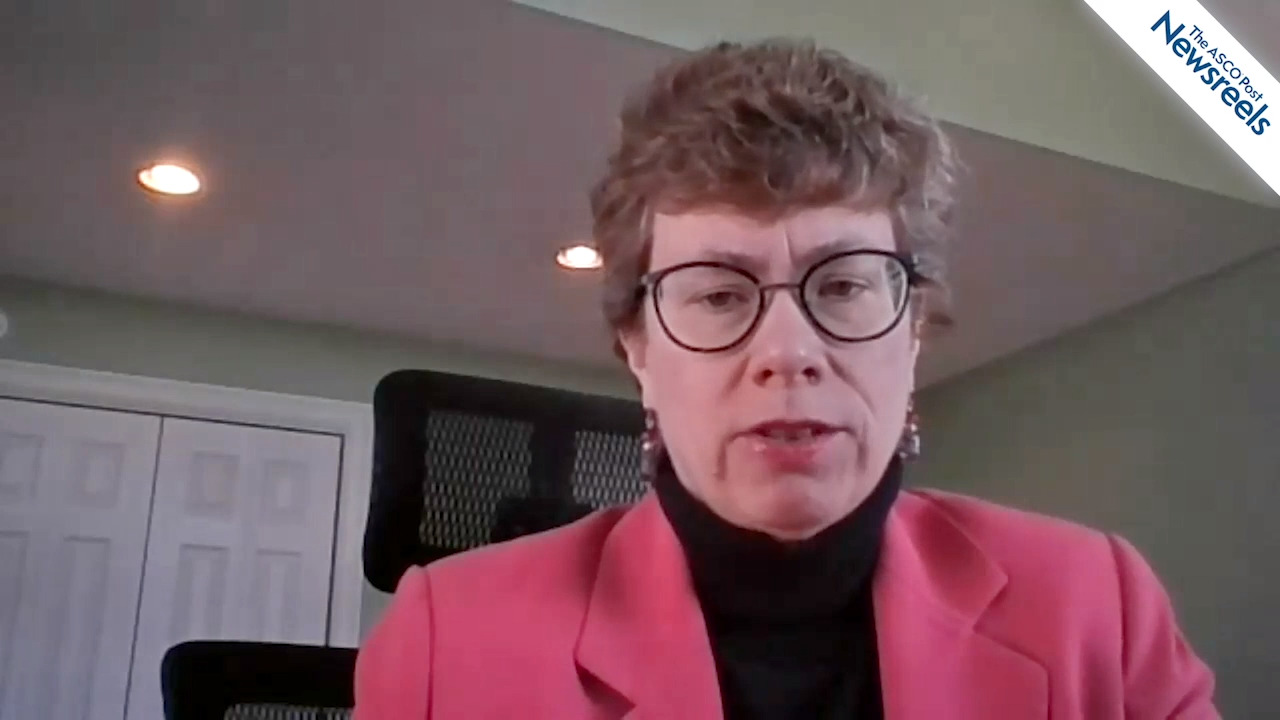Loncastuximab Tesirine-lpyl for Relapsed or Refractory Large B-Cell Lymphoma
On April 23, 2021, loncastuximab tesirine-lpyl, a CD19-directed antibody and alkylating agent conjugate, was granted accelerated approval for treatment of adult patients with relapsed or refractory large B-cell lymphoma after two or more lines of systemic therapy, including diffuse large B-cell...
Martin Hutchings, MD, PhD, on Hodgkin Lymphoma: Brentuximab Vedotin With Chemotherapy
Martin Hutchings, MD, PhD, of Copenhagen University Hospital, discusses a 5-year update of the phase III ECHELON-1 study, which suggested brentuximab vedotin plus doxorubicin, vinblastine, and dacarbazine benefits patients with previously untreated stage III or IV classical Hodgkin lymphoma (Abstract S205).
Gaurav Goyal, MD, on DLBCL: Comparing R-CHOP and R-EPOCH for Overall Survival Benefits
Gaurav Goyal, MD, of the University of Alabama at Birmingham, reports on findings from a large multi-institutional database study, which showed there was no apparent difference in overall survival between R-CHOP and R-EPOCH among patients with advanced-stage MYC-rearranged, double-hit, or triple-hit diffuse large B-cell lymphoma. Further studies are needed for better risk stratification to optimize outcomes (Abstract S224).
ctDNA and Early Relapse After Axicabtagene Ciloleucel Infusion in Large B-Cell Lymphoma
In a prospective study reported in the Journal of Clinical Oncology, Frank et al found that monitoring of circulating tumor DNA (ctDNA) improved detection of early relapse after axicabtagene ciloleucel infusion in patients with relapsed or refractory large B-cell lymphoma. Study Details A total of...
Brian K. Link, MD, on Mantle Cell Lymphoma: Expert Perspective on Treatments Now and Those to Come
Brian K. Link, MD, of the University of Iowa Carver College of Medicine, reviews three abstracts on state-of-the-art therapies for mantle cell lymphoma: bendamustine, rituximab, lenalidomide and bortezomib; treatment patterns and outcomes for previously untreated patients; and venetoclax, lenalidomide, and rituximab in newly diagnosed disease (Abstracts 7503, 7504, and 7505).
Paolo Ghia, MD, PhD, on CLL/SLL and Ibrutinib Plus Venetoclax: A Primary Analysis of the CAPTIVATE Trial
Paolo Ghia, MD, PhD, of the Università Vita-Salute San Raffaele, discusses phase II results from the CAPTIVATE study, which examined ibrutinib plus venetoclax as a fixed-duration first-line treatment in patients with chronic lymphocytic leukemia/small lymphocytic lymphoma (Abstract 7501).
Phase II Study of Naratuximab Emtansine Plus Rituximab in DLBCL
Adding the antibody-drug conjugate naratuximab emtansine to rituximab resulted in favorable overall survival and complete response rates for patients with relapsed or refractory diffuse large B-cell lymphoma (DLBCL), with a manageable safety profile. These findings from a phase II study were...
Study Explores Incidence Rates for Various Pediatric Cancers Across Age and Racial Groups
New research has uncovered substantial differences in the rates of childhood cancers when considering a single year of age rather than grouping several years together. The study, published by Marcotte et al in the journal Cancer, also found that minority children seem to have different risks than...
Ibrutinib/Venetoclax vs Chlorambucil/Obinutuzumab in Previously Untreated Older Patients With CLL/SLL
In a primary analysis of the phase III GLOW study, a once-daily, all-oral, fixed-duration dose of ibrutinib and venetoclax for chronic lymphocytic leukemia (CLL)/small lymphocytic lymphoma (SLL) resulted in superior progression-free survival than treatment with chlorambucil and obinutuzumab. Arnon...
Zanubrutinib vs Ibrutinib in Relapsed/Refractory CLL/SLL: ALPINE Trial
Zanubrutinib—a second-generation Bruton's tyrosine kinase (BTK) inhibitor—significantly improved response rates and delayed disease progression as compared to the standard of care, ibrutinib, in patients with relapsed or refractory chronic lymphocytic leukemia or small lymphocytic lymphoma...
Axicabtagene Ciloleucel Demonstrates Improvement Across Multiple Endpoints in Relapsed or Refractory Follicular Lymphoma
In the treatment of relapsed/refractory follicular lymphoma, a comparison of data from the ZUMA-5 trial with those of the external control cohort of the SCHOLAR-5 trial showed substantial improvement in all clinical endpoints with axicabtagene ciloleucel. John G. Gribben, DSc, FRCP, FRCPath,...
Ann S. LaCasce, MD, on Hodgkin Lymphoma: PET-Adapted Therapy for Bulky Disease
Ann S. LaCasce, MD, of Dana-Farber Cancer Institute, discusses results from the CALGB 50801 Alliance study, which showed that a PET scan–adapted approach may reduce the need for radiation treatment and may improve progression-free outcomes in patients with stage I/II bulky classic Hodgkin lymphoma (Abstract 7507).
Addition of Copanlisib to Rituximab Improves Progression-Free Survival in Relapsed Indolent Non-Hodgkin Lymphoma
As reported in The Lancet Oncology by Matthew J. Matasar, MD, of Memorial Sloan Kettering Cancer Center, and colleagues, the phase III CHRONOS-3 trial has shown that the addition of the pan-class I PI3K inhibitor copanlisib to rituximab significantly improved progression-free survival vs rituximab ...
Adding Targeted Agent to Treatment Shows Significant Benefits in Pediatric Patients With High-Risk Hodgkin Lymphoma
Integrating the antibody-drug conjugate brentuximab vedotin into the front-line treatment of pediatric patients with high-risk Hodgkin lymphoma “facilitated significant reduction in radiation exposure and yielded excellent outcomes,” Monika Metzger, MD, MSc, Director for the Central and South...
Lisocabtagene Maraleucel for Relapsed or Refractory Large B-Cell Lymphoma
On February 5, 2021, lisocabtagene maraleucel was approved for the treatment of adult patients with relapsed or refractory large B-cell lymphoma after two or more lines of systemic therapy, including diffuse large B-cell lymphoma (DLBCL) not otherwise specified (including DLBCL arising from...
Pembrolizumab as Long-Term Treatment Option in Relapsed or Refractory Classical Hodgkin Lymphoma
For patients with relapsed or refractory classic Hodgkin lymphoma (HL), salvage chemotherapy followed by autologous hematopoietic stem cell transplant (HSCT) is the standard of care and can induce long-term remissions in at least 60% of patients.1,2 Patients with progression of disease after...
Pembrolizumab Improves Progression-Free Survival vs Brentuximab Vedotin in Relapsed or Refractory Classic Hodgkin Lymphoma
As reported in The Lancet Oncology by John Kuruvilla, MD, of Princess Margaret Cancer Centre, Toronto, and colleagues, an interim analysis of the phase III KEYNOTE-204 trial has shown significantly improved progression-free survival with pembrolizumab vs brentuximab vedotin in patients with...
FDA Pipeline: Applications Accepted for Marginal Zone Lymphoma and Lung Cancer
Recently, the U.S. Food and Drug Administration (FDA) granted Priority Review to zanubrutinib in pretreated patients with marginal zone lymphoma, and accepted a biologics license application for sintilimab injection in combination with pemetrexed and platinum chemotherapy for the first-line...
Loncastuximab Tesirine-lpyl for Heavily Pretreated Patients With Relapsed or Refractory DLBCL: LOTIS-2
As reported in The Lancet Oncology by Caimi et al, the phase II LOTIS-2 trial has shown that the CD19-directed antibody–alkylating drug conjugate loncastuximab tesirine-lpyl produced durable responses in patients with relapsed or refractory diffuse large B-cell lymphoma (DLBCL). The study supported ...
Expert Point of View: Peter Martin, MD
“With current therapies, the median survival for people with follicular lymphoma [FL] is about 20 years. Most people with FL will live as long as the general population, as it is a disease of morbidity more than mortality. That said, there is still room for improvement,” said formal CHRONOS-3...
CHRONOS-3: Addition of Copanlisib to Rituximab Extends Progression-Free Survival in Relapsed Indolent NHL
The combination of the PI3K inhibitor copanlisib plus the monoclonal antibody rituximab reduced the risk of disease progression or death by 48% compared with placebo plus rituximab in patients with relapsed indolent non-Hodgkin lymphoma (NHL), according to the results of the phase III CHRONOS-3...
Diagnosis-to-Treatment Interval and Circulating Tumor DNA Levels in Diffuse Large B-Cell Lymphoma
In a study reported in the Journal of Clinical Oncology, Stefan Alig, MD, and colleagues found that a short diagnosis-to-treatment interval in patients with diffuse large B-cell lymphoma (DLBCL) was associated with higher baseline tumor burden, reflected in higher pretreatment circulating tumor DNA ...
Brentuximab Vedotin Plus Chemotherapy in Newly Diagnosed Early-Stage Unfavorable-Risk Hodgkin Lymphoma
In a pilot study reported in the Journal of Clinical Oncology, Kumar et al found that the combination of brentuximab vedotin with AVD (doxorubicin, vinblastine, and dacarbazine) was highly active in patients with newly diagnosed, early-stage, unfavorable-risk Hodgkin lymphoma and may permit the...
FDA Grants Accelerated Approval to Loncastuximab Tesirine-lpyl for Large B-Cell Lymphoma
On April 23, the U.S. Food and Drug Administration (FDA) granted accelerated approval to loncastuximab tesirine-lpyl (Zynlonta), a CD19-directed antibody and alkylating agent conjugate, for adult patients with relapsed or refractory large B-cell lymphoma after two or more lines of systemic therapy, ...
Umbralisib for Previously Treated Relapsed or Refractory Marginal Zone Lymphoma and Follicular Lymphoma
On February 5, 2021, umbralisib was granted accelerated approval for the following indications: adult patients with relapsed or refractory marginal zone lymphoma who have received at least one prior anti–CD20-based regimen and adult patients with relapsed or refractory follicular lymphoma who have...
Glofitamab for Relapsed or Refractory B-Cell Lymphoma
In a phase I trial reported in the Journal of Clinical Oncology, Hutchings et al found that the bivalent CD20-targeting T-cell–engaging bispecific antibody glofitamab produced high response rates and was associated with manageable toxicity in patients with predominantly refractory aggressive B-cell ...
Integration of Brentuximab Vedotin Into Front-Line Treatment for Pediatric Patients With High-Risk Hodgkin Lymphoma
In a study reported in the Journal of Clinical Oncology, Metzger et al found that the integration of brentuximab vedotin into front-line treatment of pediatric patients with high-risk classical Hodgkin lymphoma resulted in avoidance of radiotherapy in many patients, as well as high rates of...
Matthew J. Matasar, MD, on Indolent NHL: New Data on Copanlisib Plus Rituximab
Matthew J. Matasar, MD, of Memorial Sloan Kettering Cancer Center, discusses phase III results of the CHRONOS-3 trial, which showed that copanlisib plus rituximab led to a 48% reduction in the risk of disease progression or death compared with placebo plus rituximab in patients with relapsed indolent non-Hodgkin lymphoma (Abstract CT001).
Copanlisib/Rituximab Extends Progression-Free Survival vs Rituximab/Placebo in Indolent Non-Hodgkin Lymphoma
The combination of copanlisib plus rituximab reduced the risk of disease progression or death by 48% compared with placebo plus rituximab in patients with indolent non-Hodgkin lymphoma, according to results of the phase III CHRONOS-3 trial presented by Matthew J. Matasar, MD, at the virtual...
Early-Phase Study Explores CAR T-Cell Therapy for Relapsed or Refractory B-Cell Lymphoma
Bispecific anti-CD19/CD20 chimeric antigen receptor (CAR) T-cell therapy was well tolerated and showed signs of clinical efficacy in patients with relapsed/refractory B-cell lymphoma, according to phase I clinical trial data presented by Ghafouri et al during week 1 of the virtual American...
Jennifer R. Brown, MD, PhD, on Managing Chronic Lymphocytic Leukemia/Small Lymphocytic Lymphoma
Jennifer R. Brown, MD, PhD, of Dana-Farber Cancer Institute, discusses treatment choices for patients with relapsed or refractory CLL/SLL, when to stop therapy due to adverse events, BTK inhibitors and their second-generation counterparts, the need for ways to manage disease progression on novel drugs, and minimal residual disease as a predictor of response.
Pembrolizumab vs Brentuximab Vedotin in Relapsed or Refractory Classical Hodgkin Lymphoma: KEYNOTE-204 Trial
As reported in The Lancet Oncology by John Kuruvilla, MD, and colleagues, an interim analysis of the phase III KEYNOTE-204 trial has shown significantly improved progression-free survival with pembrolizumab vs brentuximab vedotin in patients with relapsed or refractory classical Hodgkin lymphoma....
Challenges in Managing Hodgkin Lymphoma: Focus on Use of Brentuximab Vedotin
“I was taught that the way of progress was neither swift nor easy.” —Marie Curie To complement The ASCO Post’s continued comprehensive coverage of the 2020 American Society of Hematology (ASH) Annual Meeting & Exposition, here are two abstracts selected from the meeting proceedings focusing on...
Noncovalent BTK Inhibitor Pirtobrutinib in Relapsed or Refractory B-Cell Malignancies
In the phase I/II BRUIN trial reported in The Lancet, Anthony R. Mato, MD, and colleagues found that the noncovalent Bruton’s tyrosine kinase (BTK) inhibitor pirtobrutinib produced durable responses in patients with relapsed or refractory B-cell malignancies, including those previously treated with ...
Umbralisib for Relapsed or Refractory Indolent Non-Hodgkin Lymphoma
As reported in the Journal of Clinical Oncology by Nathan H. Fowler, MD, and colleagues, the phase IIb UNITY-NHL trial has shown that the dual PI3Kδ/casein kinase (CK) 1ε inhibitor umbralisib produced durable responses in patients with relapsed or refractory indolent non-Hodgkin lymphoma. The study ...
ROBUST Trial: Addition of Lenalidomide to R-CHOP in Previously Untreated ABC-Type DLBCL
As reported in the Journal of Clinical Oncology by Grzegorz S. Nowakowski, MD, and colleagues, the phase III ROBUST trial showed that the addition of lenalidomide to R-CHOP (rituximab plus cyclophosphamide, doxorubicin, vincristine, and prednisone; R2-CHOP) did not significantly improve...
Effect of Risk-Adapted Therapy on Long-Term Morbidity in Pediatric Patients With Hodgkin Lymphoma
In an analysis from the Childhood Cancer Survivor Study reported in the Journal of Clinical Oncology, Kevin C. Oeffinger, MD, and colleagues found that adoption of risk-adapted therapy in the 1990s was associated with reduced risk of serious chronic health conditions in pediatric Hodgkin lymphoma...
Crizotinib for Children and Young Adults With Relapsed or Refractory Systemic ALK-Positive Anaplastic Large Cell Lymphoma
On January 14, 2021, crizotinib was approved for treatment of pediatric patients 1 year of age and older and young adults with relapsed or refractory systemic anaplastic large cell lymphoma (ALCL) that is ALK-positive.1,2 The safety and efficacy of crizotinib have not been established in older...
FDA Grants Accelerated Approval to Axicabtagene Ciloleucel for Relapsed or Refractory Follicular Lymphoma
On March 5, the U.S. Food and Drug Administration (FDA) granted accelerated approval to axicabtagene ciloleucel (Yescarta) for adult patients with relapsed or refractory follicular lymphoma after two or more lines of systemic therapy. ZUMA-5 Approval in follicular lymphoma was based on a...
Five-Year Outcomes With Tisagenlecleucel in Patients With Relapsed or Refractory B-Cell Lymphomas
As reported in a letter to the editor in The New England Journal of Medicine by Elise A. Chong, MD, and colleagues, long-term follow-up of a single-center trial of tisagenlecleucel showed maintained responses in a high proportion of patients with relapsed or refractory diffuse large B-cell lymphoma ...
Anti-CD20 Monoclonal Antibodies and Risk of Severe COVID-19 Infection and Death in Patients With Lymphoma
Patients with lymphoma hospitalized for severe COVID-19 infection were at higher risk for prolonged hospital stay and death if they were treated with B-cell–depleting therapies (eg, rituximab, obinutuzumab) within the previous 12 months. The risk of persistent COVID-19 infection was also higher in...
B-Cell and T-Cell Non-Hodgkin Lymphomas
To complement The ASCO Post’s continued comprehensive coverage of the 2020 American Society of Hematology (ASH) Annual Meeting & Exposition, here are several abstracts selected from the meeting proceedings focusing on the assessment and treatment of patients with B-cell and T-cell non-Hodgkin...
Addition of Lenalidomide to R-CHOP in Newly Diagnosed Patients With DLBCL
In a phase II signal-seeking trial (ECOG-ACRIN E1412) reported in the Journal of Clinical Oncology, Grzegorz S. Nowakowski, MD, and colleagues found that the addition of lenalidomide (R) to R-CHOP (rituximab plus cyclophosphamide, doxorubicin, vincristine, and prednisone; R2CHOP) improved outcomes...
PET-Guided Omission of Consolidation Radiotherapy in Early-Stage Unfavorable Hodgkin Lymphoma
In a phase III German Hodgkin Study Group trial (GHSG HD17) reported in The Lancet Oncology, Peter Borchmann, MD, and colleagues found that positron-emission tomography (PET)-guided omission of consolidation radiotherapy was associated with noninferior progression-free survival among patients with...
Treatment With LOXO-305 Results in Durable Efficacy in Heavily Pretreated Patients With CLL/SLL
Despite the marked efficacy of ibrutinib, acalabrutinib, and venetoclax in chronic lymphocytic leukemia/small lymphocytic lymphoma (CLL/SLL), treatment failure can occur through the development of resistance. In addition, patients in whom Bruton’s tyrosine kinase (BTK) inhibitors and BCL2...
Novel Therapies and New Indications for Use in Treatment of Hematologic Malignancies
Selinexor: On December 18, 2020, the U.S. Food and Drug Administration (FDA) approved selinexor (Xpovio) in combination with bortezomib (Velcade) and dexamethasone for the treatment of adult patients with multiple myeloma who have received at least one prior therapy. Venetoclax: On October 16,...
Expert Point of View: Marco Ruella, MD
Marco Ruella, MD, of Perelman School of Medicine and Scientific Director of the Lymphoma Program, University of Pennsylvania, commented on this study on CD58 aberrations: “This is a very important study because it describes a possible new mechanism for relapse after CAR-T19 immunotherapy in...
Overcoming CD58 Loss May Be Promising Path to Overcoming Resistance to CAR T-Cell Therapies
Engineering chimeric antigen receptor (CAR) T cells to overcome CD58 loss may be a way to boost responses in patients with diffuse large B-cell lymphoma (DLBCL) who do not respond to treatment with axicabtagene ciloleucel and other CAR T-cell therapies, according to a study presented at the 2020...
Expert Point of View: James Essell, MD
James Essell, MD, Medical Director of the Blood Cancer Center, The Jewish Hospital-Mercy Health Cincinnati Cancer and Cellular Therapy Center, and Chair of Cellular Therapy, observed that axicabtagene ciloleucel compares favorably with other chimeric antigen receptor (CAR) T-cell products being...
ZUMA-5: Axicabtagene Ciloleucel Elicits Response in Indolent Non-Hodgkin Lymphoma
In the phase II ZUMA-5 trial, the cellular immunotherapy axicabtagene ciloleucel led to responses in 92% of patients with indolent non-Hodgkin lymphoma (NHL), researchers reported at the 2020 American Society of Hematology (ASH) Annual Meeting & Exposition.1 Axicabtagene ciloleucel has improved ...
